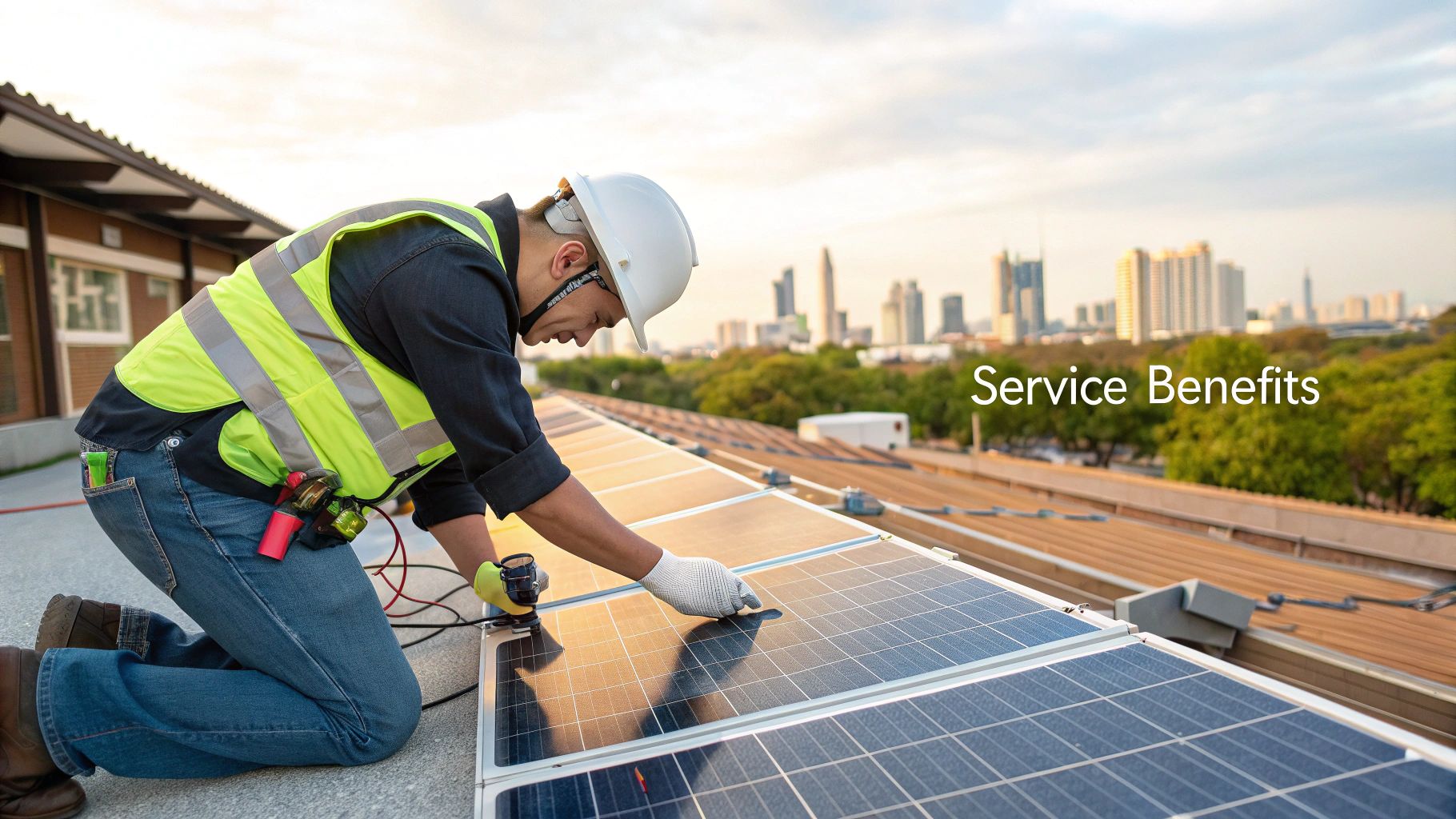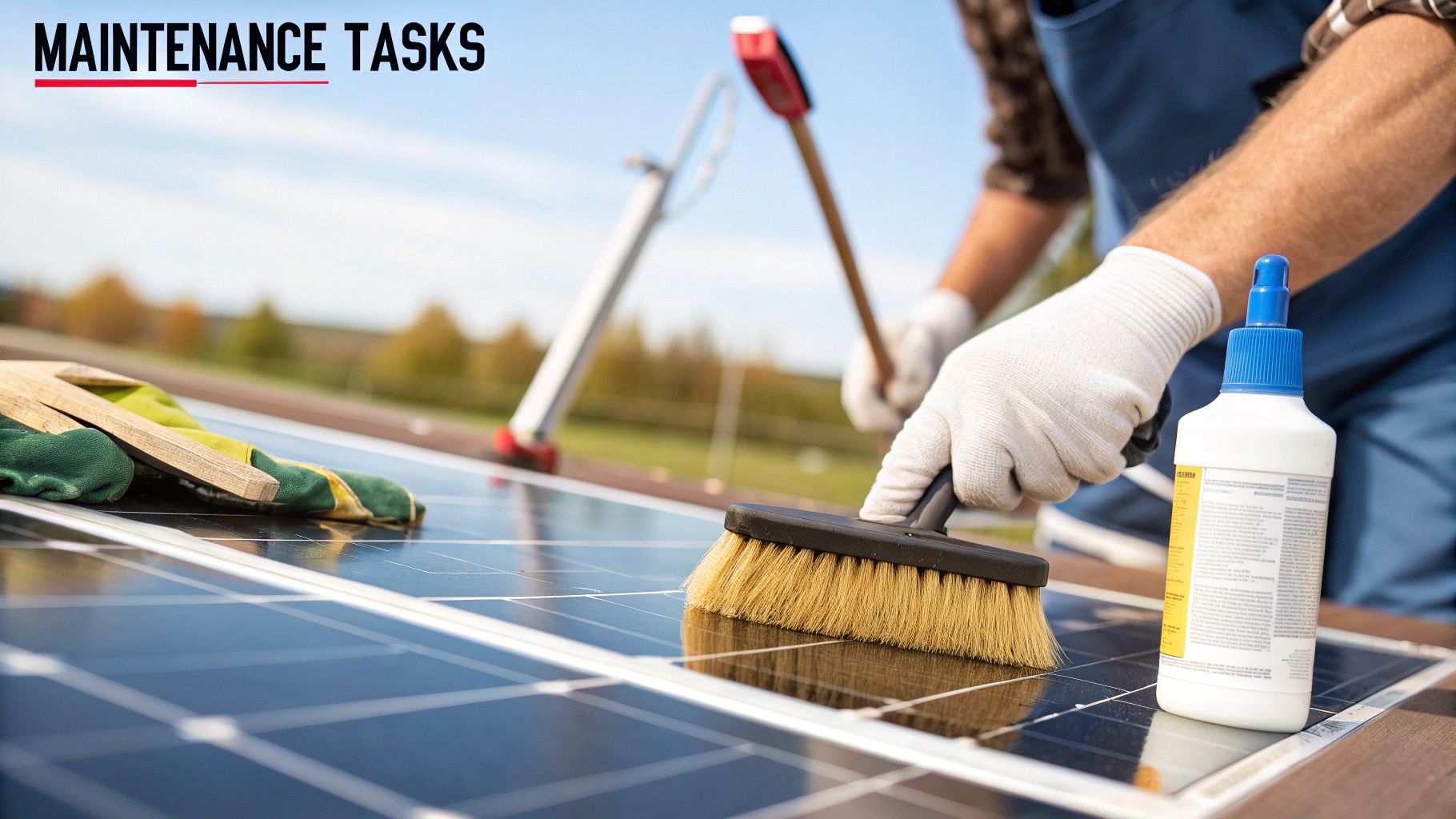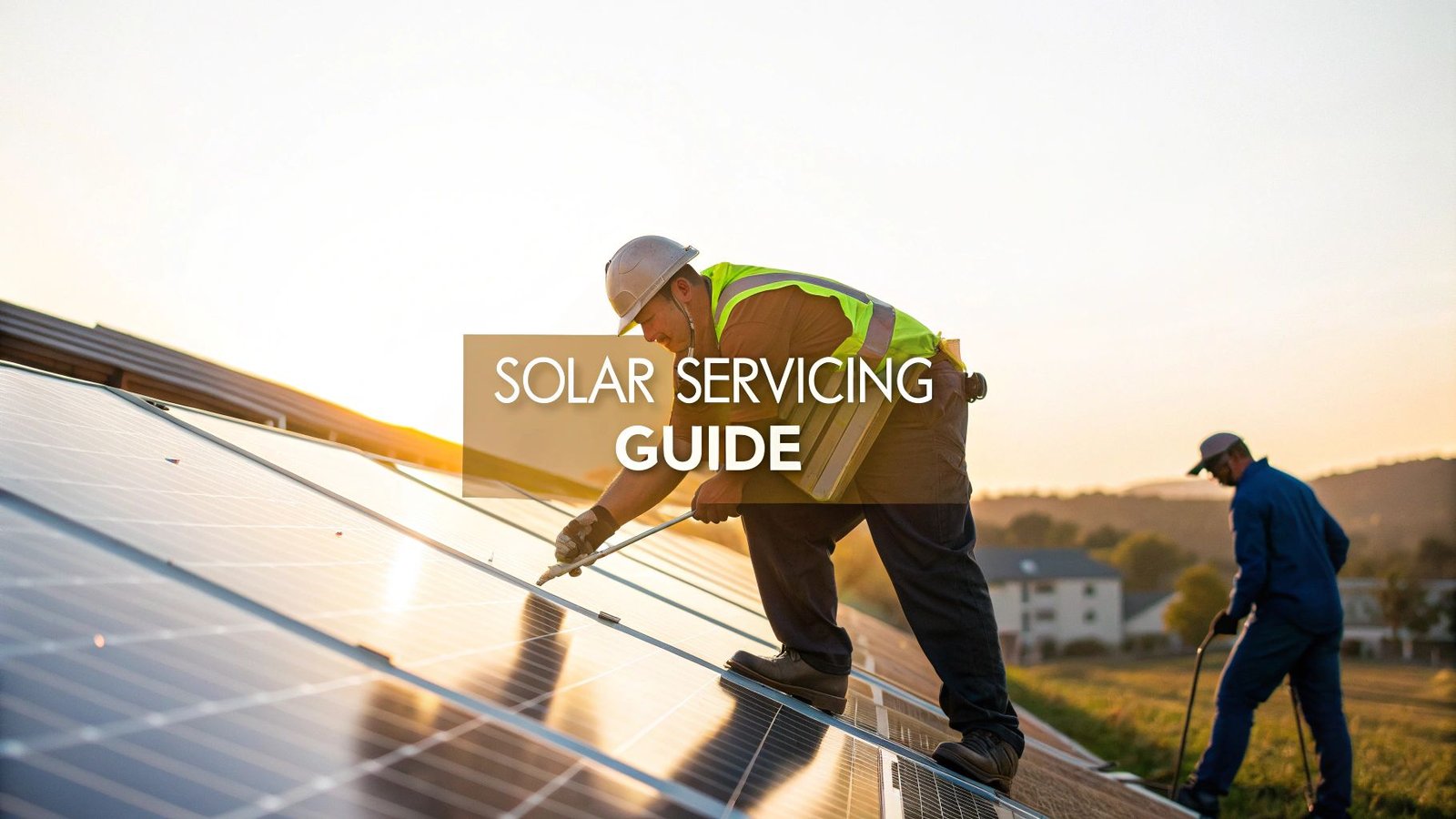Think of solar panel servicing less like an expense and more like preventative healthcare for your home's energy system. It’s a lot like taking your car in for a regular tune-up—a small, proactive step that keeps it running smoothly and helps you avoid a massive, unexpected repair bill down the line. This kind of routine care is what protects your investment for the long haul.
Why Solar Panel Servicing Is a Smart Investment
Putting solar panels on your roof is a big decision, so it only makes sense to protect that asset. Regular solar panel servicing is the best way to ensure your system is working as hard as it can for you, maximizing your returns year after year.
Skipping routine maintenance is a bit like never changing the oil in your car. Sure, it'll run for a while, but eventually, performance is going to drop, and you're risking a serious breakdown. For solar panels, this neglect leads to a slow but steady decline in energy production. A thin film of dirt, pollen, and bird droppings can accumulate, literally blocking the sun and hampering efficiency.
Maximizing Energy Output and Longevity
The whole point of servicing is to keep your panels churning out as much clean electricity as possible. It’s surprising, but even a thin layer of grime can noticeably cut a panel’s output. A professional cleaning and inspection makes sure every single solar cell is soaking up the maximum amount of sunlight, which translates directly into lower energy bills.
Beyond just cleaning, this proactive approach can dramatically extend the life of your entire system. A trained technician can spot tiny problems—maybe a loose connection or a component showing early signs of wear—and fix them before they snowball into a major system failure. This preventative mindset is always cheaper than footing the bill for a big emergency repair.
The image below really drives home the immediate impact servicing can have on your system's performance.
As you can see, a proper professional service can boost panel efficiency by up to 15%. That's a huge gain that goes right back into your pocket through energy savings.
The Financial and Safety Benefits
As more people go solar, the need for professional care has become crystal clear. The solar panel maintenance market is actually expected to grow by about 8.6% each year between 2025 and 2031. This isn't just a trend; it's a reflection of how crucial it is to keep these systems safe and efficient.
graph TD
subgraph Projected Growth of Solar Maintenance Market
A[2025] --> B[2026];
B --> C[2027];
C --> D[2028];
D --> E[2029];
E --> F[2030];
F --> G[2031];
end
style A fill:#f9f,stroke:#333,stroke-width:2px
style G fill:#f9f,stroke:#333,stroke-width:2px
link A,B,C,D,E,F,G stroke-width:3px,stroke:green,color:green
link A text ~8.6% CAGR
A well-maintained solar system isn't just about saving money on electricity; it’s about ensuring the safety and structural integrity of your home.
During a service visit, technicians do more than just clean. They check that all the mountings are still secure, inspect the wiring for any damage, and look for potential electrical hazards that an untrained eye would easily miss.
These benefits extend beyond just your utility bill. A well-cared-for solar installation is a valuable asset, aligning with other effective strategies to raise property value. And if you want to keep a close eye on your system's performance yourself, a good https://radiantenergysolar.com/solar-monitoring-system/ is an indispensable tool for spotting issues early.
What's on a Professional Solar Servicing Checklist?

So you know why servicing your solar panels is a good idea, but what exactly happens during a professional visit? It’s far more than just a quick rinse with a hose. A proper service is a top-to-bottom health check for your entire solar energy system, aimed at spotting little issues before they snowball into costly headaches.
Think of it like the annual check-up you get for your car. The mechanic doesn't just kick the tires—they get under the hood, check the fluids, and run diagnostics. A solar pro does the same for your energy system, making sure every single part is safe, secure, and working at peak performance.
Physical and Structural Inspection
First things first, a technician will give your entire setup a thorough physical once-over. Your panels live a tough life, baking in the sun, getting pelted by rain, and standing up to high winds. All that weather can eventually wear down the hardware holding everything in place.
Here’s what they’re looking for on the roof:
- Panel Cleaning: Using the right tools, they'll gently scrub away all the built-up dirt, pollen, and bird droppings that are literally blocking your panels from soaking up the sun.
- Mounting Hardware Check: They'll physically check and tighten every bolt and clamp to make sure your panels are locked down tight and ready for the next big storm.
- Wiring Inspection: All the wiring is carefully inspected for signs of damage from pests, sun exposure, or fraying. Damaged wires are a serious fire risk.
- Roof Penetration Sealing: The seals where the mounts go through your roof are checked to ensure they’re still watertight, preventing any potential leaks.
Electrical and Performance Diagnostics
After confirming everything is structurally sound, the technician moves on to the electrical core of your system. This is where their specialized training really comes into play, as they're dealing with high-voltage components. The goal is to make sure your system is converting sunlight into power as efficiently—and safely—as it should.
This part of the inspection is all about finding the invisible problems. For a deeper dive into the specifics, you can check out this detailed solar panel maintenance checklist which breaks it all down. Key electrical checks always include:
Inverter Diagnostics: The inverter is your system's brain. A technician will run diagnostics, check for any fault codes, and make sure its cooling fans are clean and functioning. Overheating is a primary cause of inverter failure, so this is a crucial step.
To find problems that aren't obvious, pros use some pretty cool technology. One of the most important tools in their kit is a thermal imaging camera.
A thermal camera lets a technician literally see heat. They can spot "hot spots" on your panels or wiring that are completely invisible to the naked eye. These hot spots are red flags for bad cells or high electrical resistance, which crush your system's efficiency and can even become a fire hazard. This kind of proactive diagnostic work is what professional solar panel servicing is all about.
How Often Your Solar Panels Need Servicing

One of the first questions I get from new solar owners is, "So, how often do these things actually need a check-up?" While it would be great to give a single, simple answer, the truth is, there’s no magic number.
The real answer depends almost entirely on your local environment.
Think about it like this: a car that only ever sees clean, suburban highways won't need a wash nearly as often as one that kicks up dust on country roads every day. Your solar panels are no different. A system in a quiet neighborhood has a much easier life than one battling the elements in a harsher setting.
Location Is Everything
If your home is in an area with a lot of dust, pollen, or nearby farming, your panels will naturally get dirtier, faster. That grime can seriously impact performance. Homes near the coast have their own unique challenge: salt spray from the ocean, which can leave a corrosive film that needs to be washed away.
Getting familiar with different predictive and preventive maintenance approaches helps you build the right schedule to keep your specific system running at its best.
To give you a clearer idea, I've put together a table that breaks down recommended service timelines based on common environmental conditions.
Recommended Solar Servicing Frequency by Environment
This table serves as a handy guide to help you figure out a good starting point for your professional maintenance schedule.
| Environment Type | Key Factors | Recommended Service Frequency | Primary Service Focus |
|---|---|---|---|
| Urban/Suburban | Low dust, moderate pollen, traffic pollution | Every 12-18 months | General cleaning, inverter check |
| Rural/Agricultural | High dust, pollen, and organic debris | Every 6-12 months | Heavy grime removal, pest inspection |
| Coastal | Salt spray, high humidity, bird activity | Every 6-12 months | Salt film removal, corrosion check |
| Industrial/Highways | Soot, industrial pollutants, heavy grime | Every 6 months | Chemical residue removal, panel cleaning |
Of course, this is just a guideline. Always keep an eye on your system's output and visible condition to fine-tune your schedule.
Don't Forget Your Warranty
Beyond your local environment, there's another critical document to consider: your manufacturer's warranty. This isn't just a piece of paper you file away. Ignoring its maintenance requirements can be a very expensive mistake, as many companies require a minimum service schedule to keep your coverage active.
Always consult your warranty documents. They often outline specific maintenance requirements, and failing to adhere to them could void your coverage when you need it most.
Sticking to the manufacturer's recommended schedule does more than just protect your investment—it ensures that if you ever need to make a claim, it will be honored without a hitch. The best strategy is to create a plan that works for both your location and your warranty, giving you great performance and total peace of mind for years to come.
Decoding the Costs of Solar Panel Servicing
Let's talk money. Figuring out the cost of solar panel servicing is a huge part of owning a system, but it's best to think of it as an investment in performance, not just another bill to pay. There isn't a single, one-size-fits-all price tag; what you'll pay depends on a few key things specific to your home.
For starters, the size of your solar array matters. A bigger system with more panels naturally takes more time to inspect and clean. The accessibility of your roof is another major factor. A technician can work much faster on a low-pitch, single-story roof than on a steep, three-story monster that requires extra safety gear and caution. And of course, the scope of the service itself—from a basic wash-down to a deep diagnostic with thermal imaging—will shape the final quote.
Breaking Down the Price Tag
So, what should you budget for? A standard professional service call, which usually covers a good cleaning, a full visual inspection, and an electrical check-up, will typically run you between $150 and $300 a year. If you opt for more advanced diagnostics, expect to be on the higher end of that range.
It's clear homeowners are seeing the value. The global market for solar operations and maintenance has swelled to around $5.83 billion, showing just how essential this work has become. It's also worth noting that broader economic factors, like international trade tariffs on solar components, can sometimes trickle down and affect the cost of parts and equipment used in servicing.
The Real Return on Investment
It’s much easier to see the service fee as an investment when you weigh it against the cost of doing nothing. A dirty or underperforming system isn't just a missed opportunity; it's actively costing you money every day the sun is out.
When you compare the modest annual cost of a service call against the financial hit from lost energy or a sudden, major repair, the value of proactive care becomes crystal clear.
The chart below really drives this point home. A small, predictable annual expense can save you from a much larger, unexpected bill down the road. For example, an inverter is the brain of your solar system, and if it fails, you could be looking at a repair or replacement bill of over $2,000. That's a hit that regular maintenance is specifically designed to help you avoid.
gantt
title ROI of Servicing Cost vs. Potential Losses
dateFormat X
axisFormat %s
section Costs
Annual Servicing Cost: 150, 150, #89CFF0
Loss from 10% Efficiency Drop: 250, 250, #FFA07A
One-Time Inverter Replacement: 2000, 2000, #FF6347
Looking at the numbers this way, it's obvious that routine solar panel servicing is more than just a cleaning. It's a smart financial move to protect your investment, maximize your energy savings, and make sure your system keeps pumping out clean power for years to come.
DIY Solar Maintenance vs. Professional Servicing
When it comes to taking care of your solar panels, one of the biggest questions I hear is, "What can I do myself, and when do I absolutely need to call a pro?" Getting this right is about more than just keeping your system running smoothly—it's about keeping yourself safe.
There’s a clear line between a simple DIY check and a task that requires a trained technician, and that line is non-negotiable.
Some upkeep is definitely within a homeowner's reach. Think of these as hands-off, observational checks to keep a pulse on your system's health. For instance, getting into the habit of checking your system's monitoring app is a fantastic idea. It’s the easiest way to spot a dip in energy production, which is often the first sign something needs a closer look.
Safe DIY Maintenance Tasks
If your manufacturer's warranty and guidelines allow it, a gentle rinse from the ground can also be a safe and effective DIY job. This is great for washing away light dust or pollen that builds up over time. For more on that, we have a whole guide with tips on how to clean solar panels.
Here are a few things you can confidently handle on your own:
- System Monitoring: Make a habit of checking your solar monitoring app. Watch the daily and monthly output. If you see a sudden or gradual drop, it’s a clear signal that it might be time for a professional check-up.
- Visual Inspection (From the Ground): Take a walk around and look up at your panels. You don't need to get on the roof to spot obvious issues like a pile of leaves, a fallen branch, or a flock of pigeons making a mess.
- Ground-Level Rinse: If you can easily reach your panels with a garden hose from the ground, a light spray can do wonders for loose dirt. Just remember: nunca use high-pressure water or any harsh chemicals.
When to Absolutely Call a Professional
The moment a task requires getting on the roof or touching any electrical component, it’s no longer a DIY job. Full stop. It's now in the hands of a certified professional.
The dangers are very real. Solar panels produce high-voltage DC electricity, which can be fatal. Add the risk of working at heights without the right safety gear and training, and you can see why this is a job for experts only.
Your safety and the long-term health of your system are always more important than trying to save a few dollars. The risk of electrical shock, a serious fall, or causing thousands in damage just isn't worth it.
To put it simply, here’s a clear breakdown of who should be doing what.
| Task Category | DIY Safe Tasks | Professional Only (High-Risk) |
|---|---|---|
| Inspection | Visual checks from the ground | Roof-level inspection of panels, mounts, and wiring |
| Limpieza | Gentle hose rinse from ground (if accessible) | All roof-level cleaning or deep scrubbing |
| Electrical Work | Monitoring inverter for fault codes | All inverter repairs, wiring checks, and diagnostics |
| Physical Repairs | Clearing loose leaves or small debris from ground | Any panel replacement, crack repair, or hardware tightening |
How to Choose the Right Solar Service Company
Picking a company to service your solar panels is a big deal. You're not just hiring someone for a quick job; you're trusting them with a major investment in your home. It’s easy to get drawn in by the lowest price, but what you really need is a partner who knows their stuff and will keep your system running at peak performance for years.
The first thing you should look for is proof that they're a legitimate, professional operation. Any company worth its salt will be fully licensed and insured. This isn't just a formality—it protects you and your property while they’re on the roof. Don't be shy about asking to see their paperwork.
On top of that, check for special certifications. Technicians certified by the North American Board of Certified Energy Practitioners (NABCEP) have gone the extra mile to prove their skills, which tells you they're serious about quality and staying up-to-date with the industry.
Your Vetting Checklist
Before you even pick up the phone, have a clear idea of what separates the pros from the amateurs. A solid solar service company should tick all these boxes without any hesitation.
- Licensed and Insured: This is non-negotiable. It's the baseline for any contractor working on your home.
- NABCEP Certified Techs: It’s not always a legal requirement, but it’s a huge plus. Think of it as the gold standard for solar expertise.
- Solid Customer Reviews: See what other homeowners are saying. Look at reviews on a few different sites to get the full picture.
- Experience with Your Gear: Make sure they’ve actually worked on your brand of solar panels and inverter before. Not all systems are the same.
The need for skilled technicians is exploding right along with the solar industry itself. We've recently blown past 2 terawatts of global solar capacity, which is a massive milestone. But all those panels need proper care to keep them from losing efficiency over time. You can get a sense of this incredible growth from the IEA's latest global market snapshot.
A great service company won’t just clean your panels and leave. They’ll give you a full system health report. Always ask a potential company if they provide detailed reports with performance readings and photos after the job is done.
In the end, it really comes down to doing your homework. Asking pointed questions and checking credentials might feel like a little extra work upfront, but it’s the best way to ensure your solar investment is in truly capable hands.
Got Questions About Solar Panel Servicing? We've Got Answers

Even after covering the basics of solar panel servicing, a few questions always pop up. It's completely normal. Let's tackle some of the most common ones we hear from homeowners to clear up any confusion.
"Won't Rain Just Clean My Solar Panels for Me?"
It's a common thought, but unfortunately, rain isn't enough to do a thorough job. While a good downpour might wash away some surface-level dust, it often leaves behind a sticky residue of pollutants. It also won't touch stubborn grime like bird droppings or baked-on pollen.
Think of it this way: you wouldn't rely on a light drizzle to clean a muddy windshield. You need a real wash to see clearly. The same goes for your panels.
Relying only on rain can cause a slow but steady decline in your system's performance. In fact, some studies show that uncleaned panels can lose 15-20% of their efficiency compared to panels that get a professional cleaning.
"Could Servicing My Panels Actually Void My Warranty?"
This is a great question, and the answer is usually the exact opposite. Neglecting proper maintenance is far more likely to get you in trouble with your warranty. Most manufacturers spell out that their coverage is contingent on the system being properly cared for.
When you hire a certified professional for solar servicing, you’re not just cleaning your panels—you’re protecting your warranty. They know how to do the job right without causing damage. It's always a good idea to pull out your warranty paperwork and check for any specific maintenance requirements.
"What Are the Telltale Signs That My Panels Need a Service?"
The biggest giveaway is a dip in your energy production. If you check your monitoring app and notice the numbers aren't what they used to be, that’s a major red flag.
Beyond that, keep an eye out for a few other things:
- Visible Grime: If you can see a noticeable layer of dirt, leaves, or bird droppings from the ground, it's time for a cleaning.
- Inverter Alerts: Your inverter is the brain of the system. If it's flashing warning lights or showing error codes, don't ignore it.
Catching these signs early and calling in a pro can stop a small issue from snowballing into a much bigger and more expensive headache down the road.
Ready to make sure your solar system is running at peak performance? The experts at Energía radiante offer comprehensive solar panel servicing that protects your investment and keeps your energy savings high. You can schedule your professional maintenance check today and get peace of mind.




